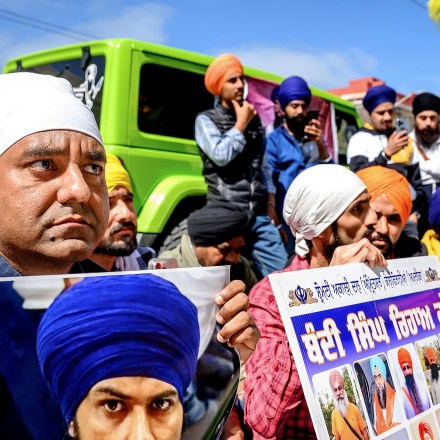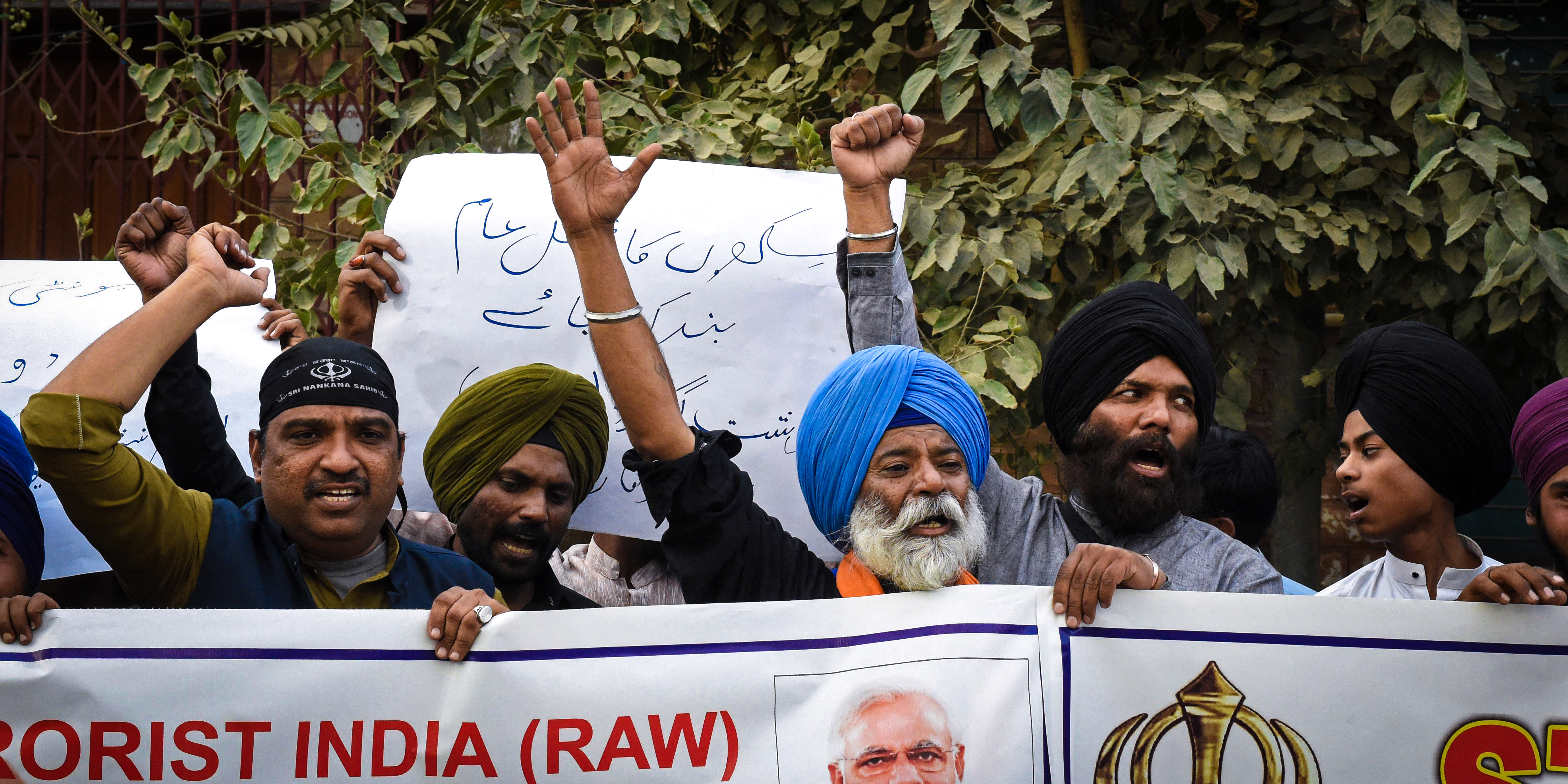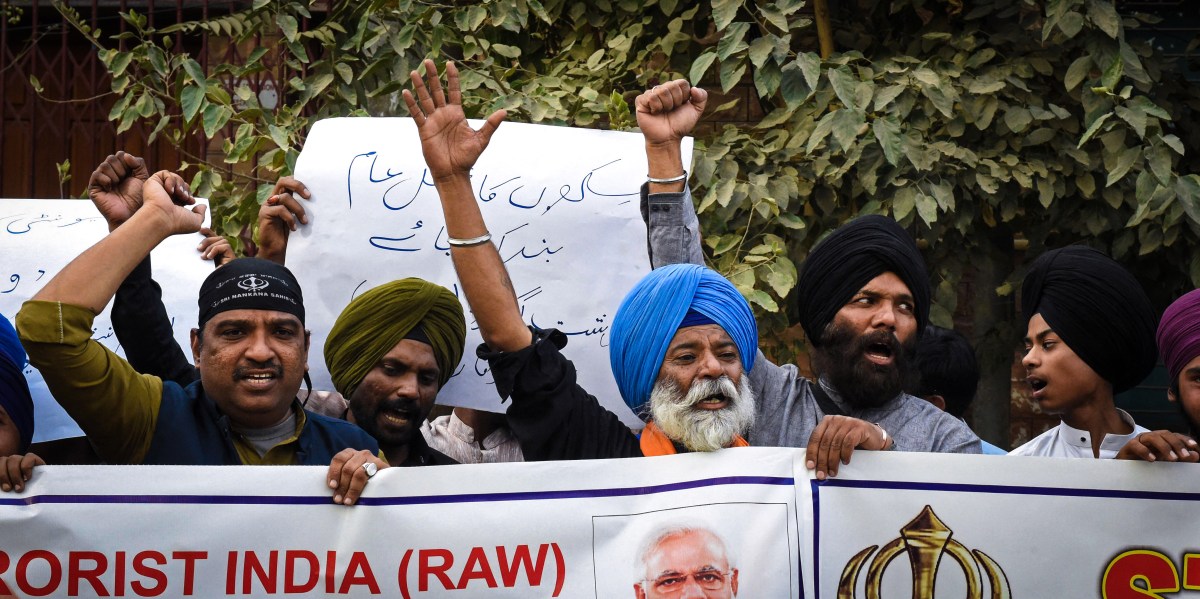SECRET INTELLIGENCE DOCUMENTS SHOW GLOBAL REACH OF INDIA’S DEATH SQUADS
Leaked Pakistani intelligence backs up Canadian claim of an Indian assassination program.
Murtaza Hussain,
Ryan Grim
November 21 2023, 9:14 p.m.
DONATE
Members of Pakistan’s Sikh community shout slogans as they hold banners during a protest in Quetta, Pakistan, on Sept. 23, 2023, to condemn the killing of Sikh separatist Hardeep Singh Nijjar in Canada. Photo: Bananas Khan/AFP via Getty Images
THE INDIAN GOVERNMENT’S intelligence agency, the Research and Analysis Wing, or RAW, has been planning assassinations targeting Sikh and Kashmiri activists living in foreign countries, according to secret Pakistani intelligence assessments leaked to The Intercept.
The intelligence documents identify a series of threats against people living in Pakistan from RAW, which Pakistani security officials believe is working in conjunction with local criminal and dissident networks to carry out assassinations and other attacks. According to the documents, RAW is targeting individuals and religious institutions alleged to support an armed insurgency in the disputed territory of Kashmir, as well as militant Sikh activists living in Pakistan and wanted by the Indian government.
The documents offer compelling substantiation for the sensational claim that India has been carrying out a transnational assassination program against its political enemies. The Canadian government first made headlines in September with the accusation that
Indian intelligence agents orchestrated the
assassination of Sikh Canadian activist Hardeep Singh Nijjar on Canadian soil. Nijjar was gunned down outside a gurdwara — a Sikh temple — this summer in Surrey, British Columbia.

In October in Britain, the family of activist Avtar Singh Khanda
called for an inquest into his sudden death, alleging that he had been poisoned by Indian intelligence agents following a series of public threats to his life. In September, The Intercept reported on threats to
Sikh activists in the U.S. after the FBI warned a number of Sikh Americans about intelligence showing that their lives were in danger after the killing of Nijjar. In 2022, a 75-year-old Sikh Canadian man named Ripudaman Singh Malik, who had been acquitted of involvement in a deadly bombing of an Air India flight in 1985, was shot to death in front of his family business in Canada under circumstances that remain unclear. Despite these accusations of involvement in international assassinations, which have caused increased friction in India’s foreign relations, so far little intelligence — Canadian, Pakistani, American, or otherwise — has been made publicly available about these killings.
According to a Pakistani intelligence assessment, this summer RAW was also targeting two Sikh activists in Pakistan for assassination in the cities of Lahore and Islamabad. One alleged target in Islamabad is unnamed, while another is Lakhbir Singh Rode, a prominent Sikh separatist leader living in Pakistan since the 1990s who has long been accused of terrorism by India’s government. Rode was involved in a movement that aimed to create an independent nation in the region of Punjab known as Khalistan in the 1980s and ’90s. That campaign was crushed by a brutal counterinsurgency that claimed the lives of thousands of Sikhs, while forcing many more into exile.
Rode’s son, a Canadian citizen named Bhagat Singh, is, like his father, prominent in the diaspora movement for Sikh separatism. He told The Intercept that his father has long been living under threat from Indian intelligence.
“It is a well-known fact that he has been on the Indian government’s hit list for years,” Singh said, adding that he was also warned by Canadian intelligence about threats to his own life following the assassination of Nijjar this summer, which he presumes are from Indian intelligence.
“When [Nijjar] was killed, the response from many of us to our governments was, ‘We told you so,’” added Singh, referring to the community of diaspora Sikh activists. “But there is also a lot of anger that a foreign government could simply come here and murder a Canadian citizen.”
The Pakistani, Indian, and Canadian embassies did not provide comment for this story. The pace of suspected attacks inside Pakistan against individuals wanted by India appears to have accelerated in recent weeks. On November 13, India media
reported the killing of another militant connected to an Islamist group in Karachi. The possible assassination followed the killings of two other Islamist militants wanted by India that had taken place recently in Pakistan’s
tribal regions and the
disputed territory of Kashmir. While covered in great detail by the Indian press, these killings have gone almost unmentioned in Pakistan, where local media and civil society are under de facto military control following the
removal of former Prime Minister Imran Khan.
The lack of attention to the suspected assassinations of both political dissidents and militants has prompted calls for more pressure on India from some members of its diaspora.
“Anyone who speaks out against the Indian government anywhere in the world is under threat,” said Singh.
THE SECRET DOCUMENTS, which were produced by Pakistan’s Intelligence Bureau, a civilian-controlled security agency somewhat akin to the FBI, show serious concern that Indian intelligence will carry out more killings on its soil in the future.
In May, the Pakistan Intelligence Bureau warned that Indian intelligence agents based in two other countries, the United Arab Emirates and Afghanistan, are being activated to carry out operations in Pakistan, suggesting that Indian operatives have a footprint throughout the region. In September, an Intelligence Bureau document again warned that the Indian government’s intelligence agency was planning “terrorist attacks” and assassinations against targets inside Pakistan: RAW agents were operating from a militant training camp in the Afghan city of Spin Boldak, it said, “to target wanted / prominent Sikh personalities in Pakistan.”
The documents are marked “Not to be disclosed/Communicated to any unauthorized person,” and The Intercept is not publishing them in full in order to protect the source who provided them. The documents specifically name threats to militants involved in the Kashmiri and Sikh separatist causes, as well as conservative Islamic movements in Pakistan. One document states that, “it has been learnt through reliable sources that hostile intelligence agency (RAW) with the collaboration of sub-nationalist groups / anti-state activists and local criminal networks is already planning to carry out terrorist attacks on the marakiz / masjid / religious seminaries / leaders / notables of Ahl-e-Hadith sect linked with organizations remained active in the Kashmir Jihad.”
Inside Pakistan, a spate of assassinations and other attacks in recent years targeted people alleged to be involved in Sikh and Kashmiri separatism as well as Islamist militancy inside India. This October, the Pakistani government
arrested people it says were involved in targeted killings of suspected militants inside Pakistan. The killings were attributed in public statements to a “hostile spy agency,” a common reference to Indian intelligence in Pakistani official communications. This summer, a former commando in Pakistan’s elite Rangers paramilitary unit was also arrested on accusations of running a network carrying out assassinations of accused militants on behalf of RAW.
“The general perception in the West is that India can do no wrong and that when Pakistan accuses India of doing these types of things, they’re just being paranoid. But that is not borne out by history,” said Arif Rafiq, a scholar at the Middle East Institute and specialist on Pakistan. “Usually, the truth of these things are only fully known decades later, but India has a long history of these types of actions. When you piece it all together, it seems clear that there is a campaign today by India’s government to take an offensive strategy against these groups.”
The Pakistani government has periodically accused RAW of involvement in bombings and targeted killings inside Pakistan, including
attacks against Chinese nationals working in the country and
bombings targeting militant leaders wanted by India. These attacks have often been claimed publicly by separatist or extremist groups at war with the Pakistani state, including in the restive provinces of Balochistan and Sindh, that Pakistan accuses of being supported by India. The Indian government, for its part, has denied involvement in these operations or patronage of Pakistan-based militant groups, while accusing Pakistan of supporting Sikh and Kashmiri militants who have fought against it in the past.
This March, the Atlantic Council, an American think tank,
published an anonymous article titled, “Who is Behind the Killings of Kashmiri Militants in Pakistan?” The article pointed to the recent killings of several former Kashmiri insurgents living in Pakistan whom the author claimed had been murdered by Indian intelligence in attacks that were left unsolved, attributed to Pakistan-based separatist groups, or deemed by the police to have been robberies gone wrong. Many of the killings targeted people who had been involved in fighting during the peak of the 1990s-era insurgency in Kashmir, but had later settled down to live and work inside Pakistan.
The article warned that the killings by Indian intelligence may torpedo attempts at rapprochement between India and Pakistan by inviting reprisals from militant groups themselves, stating, “While militant groups that have operated in Kashmir are not as strong as they used to be, they still possess significant capabilities to strike back. The assassination of their former comrades, whether perceived or real, may trigger an angry response, thus endangering peace and stability in the region.” The article also cited a former militant criticizing Pakistan’s military establishment for turning a blind eye to the killing of ex-militants on its soil as the
Kashmir dispute has lost priority in Pakistan’s foreign policy.
The anonymously authored article was subsequently pulled from the Atlantic Council website. The article was replaced with a note stating it had been removed “because it did not go through the Atlantic Council’s standard editorial process prior to publication.”
Members of Pakistan’s Sikh community take part in a protest in Peshawar, Pakistan, on Sept. 20, 2023, following the killing in Canada of Sikh separatist leader Hardeep Singh Nijjar.
Photo: Abdul Majeed/AFP via Getty Images
RODE, THE INDIVIDUAL named as a target in Pakistani intelligence documents, is the nephew of Jarnail Singh Bhindranwale, the Sikh militant leader of the 1980s separatist insurrection. That family connection has kept him on the radar of Indian authorities, who announced the
confiscation of land belonging to Rode in India this fall amid a broader crackdown on diaspora Sikh dissidents and their families.
Rode, who is living in Lahore, was described in a Pakistani intelligence document as having already been surveilled by Indian intelligence agents at a housing complex and gurdwara in the city. Information about his place of residence and the gurdwara that he frequents are included in the report, which suggests that he and another Sikh activist are at imminent risk from Indian agents or locals acting under Indian instruction. The documents warn Pakistani officials to use “heightened vigilance” and “foolproof security measures” to guard them.
According to family members, threats to Rode have increased in recent years, forcing him to go deeper into seclusion. His son, Bhagat Singh, says that surveillance photographs of his father’s car and residence had previously been sent to Pakistani authorities by Indian intelligence, as part of a demand by India to Pakistan to turn him over.
http://theintercept.com/2023/11/16/israel-palestine-gaza-student-protests/
Singh said that he himself had been placed on Canada’s no-fly list after the Indian government accused him of involvement in planning terrorist attacks in India. Singh, who is seeking legal means to remove himself from the list, strongly rejects these accusations, saying that they are part of an international campaign by the Indian government to silence dissidents in its diaspora.
“The Sikh diaspora holds protests and lobbies Western governments to speak up against the Indian government, and it is for this that we are being targeted,” Singh said. “They don’t have to prove anything in court when they make these accusations. They simply label anyone as a terrorist who fights for their rights or says that they don’t want to live under their rule anymore after what has been done to them.”
Though the Khalistan movement has been mostly suppressed in Indian Punjab, supporters have continued to rally for the cause in the diaspora, including from Pakistan and Western countries. As a result of recent protests in Western countries, some of which have resulted in vandalism and threats to Indian consular staff, the Indian government has angrily accused foreign states of nurturing the Khalistan movement in exile. Many Sikhs themselves reject what they say is an attempt by the Indian government to extend its political authority over them even as they live and gain citizenship in foreign countries.
“The diaspora is an extension of people from Punjab,” said Harinder Singh, senior fellow at the Sikh-related public education organization the Sikh Research Institute. “When dissent is being crushed, even at the level of using extrajudicial killings inside Punjab, the people who manage to escape will of course find ways to talk about these issues from abroad.”
In addition to high-profile suspected murders in Western countries, recent years have also seen at least two killings of supporters of the Khalistan movement in Pakistan. In May, Paramjit Singh Panjwar, the leader of a Pakistan-based Sikh militant organization was shot to death by an assailant on a motorcycle while out for a walk near his home in Lahore. His killing came two years after the murder of another Sikh activist in Pakistan named Harmeet Singh, who was also shot to death in Lahore near the same gurdwara frequented by Rode.
“India has been carrying out activities like this in South Asia for years. The only difference is that today they have been discovered doing it in a Western democracy,” said Harinder Singh. “Despite many hypocrisies among Western democracies, one thing that they still do take very seriously is a foreign power taking the lives of their own citizens.”
FOLLOWING THE ASSASSINATION of Nijjar in Canada this summer, Pakistan again
publicly alleged that India was running a “network of extra-territorial killings” that had now gone global. The Indian government has responded angrily to accusations from Canada and other Five Eyes countries that it is running a transnational assassination program.
But as more details on the scope and nature of its operations come to light, the crisis over the killing of Nijjar, and potentially other Sikh dissidents, seems unlikely to disappear. The targeting of Rode and other Sikhs in foreign countries suggest that India is taking a more aggressive stance in targeting perceived enemies across borders, including through violent means.
“These killings show that India feels emboldened and that it has the geopolitical space to take these kinds of risks. There has never been an instance where it has been held to account for its excesses,” said Middle East Institute’s Rafiq. “Frankly, nobody would care if they were only killing people in Pakistan. It’s only until something happens on the other side of the world that people start paying attention.”
CONTACT THE AUTHOR:
Murtaza Hussain[email protected]@mazmhussainon X
Ryan Grim[email protected]@ryangrimon X
Leaked Pakistani intelligence backs up Canada’s claim of an Indian assassination program.

theintercept.com

How much wheat is that? How much security could that buy your increasingly brutalized people?










